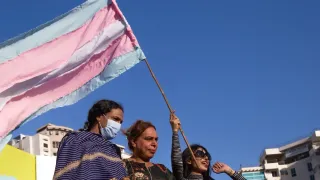
4 hours ago
Trans Woman Attacked in Washington Cites Surge in Anti-Trans Hate, Links Rhetoric to Trump Administration
READ TIME: 4 MIN.
On September 15, Nikki Armstrong, a 39-year-old transgender woman, was violently attacked by four teenagers in Renton, Washington, after a confrontation at a local bus stop. According to Armstrong, the group of teens began harassing several people waiting for their buses. Armstrong intervened, asking, “Don’t you have anything better to do?” Later that evening, as she made her way back through the area, the same group confronted her again. Despite her attempt to use pepper spray for self-defense, Armstrong was subjected to anti-LGBTQ+ slurs and chased. She eventually tripped while fleeing, at which point the teenagers assaulted her, causing serious facial injuries requiring surgery .
Renton Police confirmed that two teenage brothers, aged 15 and 17, were arrested and have been charged with second-degree assault. They were released to electronic home monitoring, and authorities are searching for two additional suspects believed to be involved in the attack .
In the aftermath of the assault, Armstrong launched a GoFundMe campaign to cover her medical expenses and to help with living costs while she recovers and is unable to work. The outpouring of support has been significant, with her campaign reaching 97 percent of its $20,000 goal through more than 360 donations. Armstrong expressed her gratitude for the community’s solidarity, stating, “That anxiety has been lifted and I can’t begin to put into words what that means to me. I can focus on my recovery and I’m ever so grateful” .
However, the incident has also left Armstrong deeply shaken. She shared that her initial feelings of fear and anger have turned to sadness, reflecting on the state of society and the factors that may have contributed to her attack. “It bums me out that kids have nothing better to do with their lives,” she told PinkNews. Armstrong further emphasized that her sense of insecurity extends beyond the threat of random violence, pointing to broader political and cultural forces at play.
Armstrong directly attributed her feelings of diminished safety to current political discourse and, specifically, the rhetoric of President Donald Trump. “I want to be clear about this: it’s not because I’m worried about being randomly attacked by teenagers. It is because of the presidential Administration that we have and their policies that I feel less safe now as a trans person than I ever have. Trump has all but greenlit this type of violence and sadly I expect we will see more,” she stated .
Armstrong’s comments reflect a broader concern among LGBTQ+ advocacy groups. According to GLAAD’s third ALERT Desk Report, which tracks anti-LGBTQ+ incidents and extremist trends, there has been a “dramatic rise” in anti-transgender hate across the United States. Between May 1, 2024, and May 1, 2025, the report documented 932 anti-LGBTQ+ incidents in 49 states and the District of Columbia, with more than half specifically targeting transgender and gender non-conforming people. This equates to approximately 2.5 incidents per day nationwide .
The political context surrounding such attacks is contentious. While Armstrong and many in the LGBTQ+ community cite incendiary rhetoric from political leaders as a contributing factor, President Trump and his supporters have repeatedly placed blame for political violence on what they term the “radical left.” In a recent interview, Trump stated, “The radicals on the left are the problem,” and accused them of promoting transgender rights and social policies he opposes . Trump has continued to frame his political opposition as a threat, vowing to address what he describes as “hate groups” on the left, while largely omitting discussion of violence faced by marginalized groups, including transgender people .
Advocates argue that such rhetoric has real-world consequences, emboldening those who harbor anti-transgender views and contributing to a climate in which hate crimes are more likely to occur . This concern is echoed by LGBTQ+ organizations and civil rights leaders across the country .
In her public statements, Armstrong addressed her attackers and others who target transgender people: “Find something better to do with your time. We are here. We’re not going anywhere. We will fight back. We protect us” . Her message resonates within a community that has long relied on mutual support and advocacy to combat discrimination and violence.
National organizations, including the Human Rights Campaign and GLAAD, have reiterated calls for policymakers to address the rise in anti-transgender hate crimes. They advocate for comprehensive hate crime legislation, increased support for survivors, and greater accountability for public figures whose rhetoric may enable or inspire violence .
Armstrong’s story is a stark reminder of the challenges facing transgender Americans, particularly as they navigate a polarized political environment. While the support she has received demonstrates the resilience and solidarity of the LGBTQ+ community, the broader issue of safety and acceptance remains an urgent concern. As Armstrong continues her recovery, advocates hope her experience will galvanize renewed efforts to protect transgender people and foster a more inclusive, respectful society for all .






